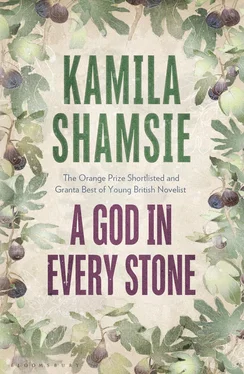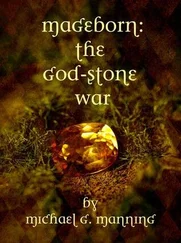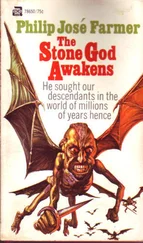So quickly, this end of the street is almost empty. The armoured cars are still in place, and troops guard Kabuli Gate but most of the noise of running feet and guns now comes from the alleyways and in the direction of Hastings Memorial. A man runs past, tries to pull her along, but she shakes him off. The ground is unpaired shoes, and men, dead and wounded, and near the watch shop a long-tailed white turban soaking in fresh blood. She runs to pick it up, touches the bloodied fabric and brings her hand to her nose. If it is Diwa’s some part of her will know it; how is it possible she can’t tell Diwa’s blood from a stranger’s? But it is only blood, it could be anyone’s. There’s a sound behind her and she turns to see a man in a red shirt with his back towards her, something strange about his posture which she doesn’t understand until she sees the tip of the bayonet protruding from his back. He falls backwards and an English soldier pulls his bayonet clear of the body, blood thickening the blade. Someone else grabs her arm and this time she doesn’t resist as a man wearing khaddar pulls her along with him, into an alley.
A doorway opens, women’s hands pull her in to safety. My sister, she says, and tries to walk back out, but they stop her, hold her with force until she stops struggling. There is nothing you can do, they say.
One of them will die. This sentence is a thought she can’t unthink. Her husband, her sister. One of them will die. She backs herself into a corner of the room and sits pressed against the walls, her head in her hand. Outside the bullets don’t stop.
Three years ago on a day when she thought she fully understood terror, Zarina walked unrecognised down the street on which she had grown up, her body hunched over so her height wouldn’t give her away. Her destination was the carpet-seller’s house which overlooked the Street of Storytellers. Entering the house, throwing off her burqa, she said the words her late mother had trained her to say when the time came to be married to a murderer in repayment for her father’s death: I come seeking the protection of your house which can only be given to me through marriage. The carpet-seller knew immediately who she was and she understood then that he and her mother had agreed long ago that she would come here and invoke Pashtunwali, allowing him to become responsible for her life.
It was only after the carpet-seller said she was welcome into his family that she thought to look around the room for her husband-to-be and, in the cluster of family members who were looking at her in shock, saw one adoring face — Diwa. It was Diwa who loved her first and who she loved first in the household. Zarina holds the turban close to her chest although the smell of blood is almost unbearable. Her love for her husband came later, but once she recognised it she was able to look back and understand that the seeds of it were already there when she woke up beside him on the first morning of her married life and knew that now there would always be this secret life, these altered selves, known to no one but the two of them.
Hours later the women lift her up from the corner of the room because her unmoving limbs have stiffened into their cross-legged posture. One of the young sons of the household says he’ll walk home with her, but when he asks his mother to give this stranger a burqa the older woman says it’s safer to be uncovered so the English don’t think it’s a nationalist trying to hide.
They walk all the way to the Street of Storytellers before an English soldier stops them and tells them to return home. When the boy explains the soldier says the woman can cross the road without any help; he won’t be fooled by trouble-makers using women as shields to allow them to move around the city freely. Zarina barely hears this exchange. In the twilight gloom she looks up and down the street, trying to make sense of it. The bodies have gone, and even as she watches there’s a roaring sound and water jets out of the hose of a fire-engine at Kabuli Gate, and then another hose, and another. Where is your house, the soldier asks. She points, and he says, Go there directly, I’m watching.
She goes as quickly as possible, bare feet splashing through the bloodied water while shoes of different sizes race past her in the opposite direction. The front door of her house is ajar, and as she enters and starts to climb the stairs she hears her husband’s voice. He must be talking to Diwa — they are both here! Here, and worrying about her. But the other voice is a man’s voice, coming from the balcony. She is just a few feet away when she hears him say he can’t express his regret sufficiently, but he had to put her body down in order to help the wounded, and now she’s gone, along with all the other corpses on the street.
Zarina runs the stiff-blooded fabric of the turban between her fingers, and swears that she will kill the man who sent Diwa into the bullets.
When her husband returns home from his fruitless attempt to get past the soldiers and look for Diwa’s body she takes him into his bedroom and shows him the frock-coat with the bullet hole and the business cards lying beside it on the bed. His voice is unfamiliar with grief as he reads out what is written there: Najeeb Gul, Indian Assistant, Peshawar Museum.
— What will you do to him?
— Zarina, don’t.
— Don’t what?
A banging on the front door interrupts them. There aren’t any servants in the house — they’re all either in Kohat or still taking a few days to visit their families, unaware that some members of the household have returned — so there’s no one to answer the door. It will be neighbours checking that everyone is all right and when they find out what’s happened the house will fill with mourners and she and her husband will be pulled apart into the men and women’s sections of the house. Pretend we’re not here, her husband says. I just want to be with you tonight.
But the hammering on the door goes on and on, and finally he stands up and says, I’ll take care of it. He’s been gone only a few seconds when the presence of Diwa in this room, in those last seconds they had together, catches her by the throat. Diwa is dead. Diwa is dead, and she is still living, and will go on living without her. This surge of pain, this rushing sense of enormity. She is dead, she will never be any less dead than she is now. How can Zarina survive even this moment — right now. She will not survive it. She opens the shutters, there’s no air in her lungs. On the balcony, shards of earthenware, spilt water. She kneels, picks up a jagged piece of fired earth. From her throat, rasping sounds. And through them her husband’s voice calling her name. When she turns he’s standing there, gripping the upper arm of a man in a bloodied shirt, who doesn’t flinch or try to move: Najeeb Gul.
— This is my fault, he says.
When he speaks she sees the point in his throat where she can jam the tip of the earthenware shard, pushing through skin and cartilage. She grips the shard, walks up close to him.
— Why have you come here?
— I saw her fall, but I didn’t see what happened after. I came to see if she was –
He can’t say either the word ‘alive’ or ‘dead’, and she can tell her husband wishes he had sent away this young, open-faced man instead of bringing him up here. Her husband has lived his life in a world abundant with good fortune where softness is given the name refinement. Grief is making his heart flood with tears instead of blood.
— Zarina, it’s the English who killed my sister, not this man, whatever he did.
— What do you know of what he did?
She picks up the frock-coat and brings it close to her husband.
— He violated the sanctity of our home and came into our bedroom with your sister, she says. She sees her husband flinch at that and presses on. He took off his clothes. And where was she when this happened, when this man undressed himself? Ask him if he touched her, and how? What did he do to her, what promises did he make, to send her flying through a crowd of strange men towards him when he was injured?
Читать дальше












